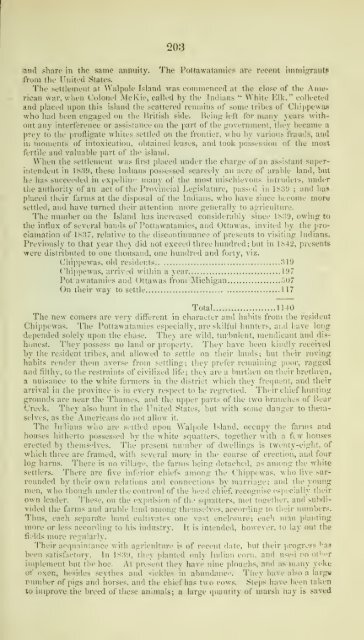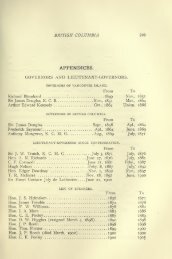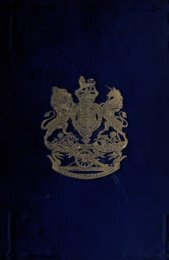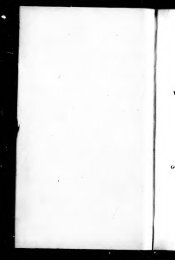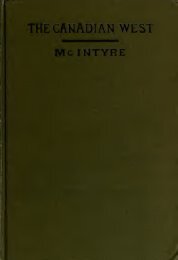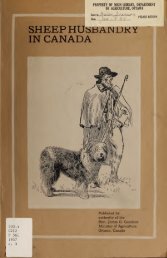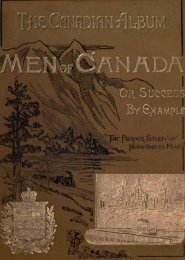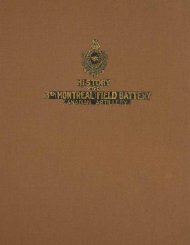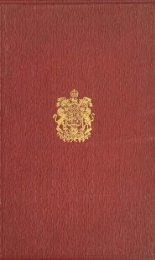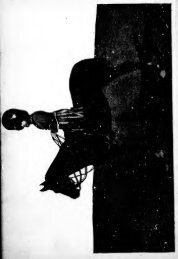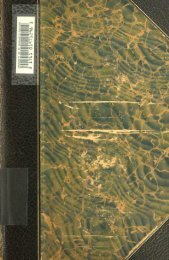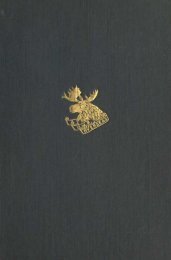Smith's Canadian gazetteer - ElectricCanadian.com
Smith's Canadian gazetteer - ElectricCanadian.com
Smith's Canadian gazetteer - ElectricCanadian.com
You also want an ePaper? Increase the reach of your titles
YUMPU automatically turns print PDFs into web optimized ePapers that Google loves.
203<br />
and share in the same annuity. The Pottawataniics are recent iinmigjantf<br />
fi'om the United States.<br />
The settlement at Walpole Island was <strong>com</strong>menced at the close of the American<br />
wur, when Colonel McKie, called by the Indians " White Elk," collected<br />
and placed upon this island the scattered remains of some tribes of Ch![)pe\vas<br />
who had been engaged on the British side. Jk'iiig kit for many \ears without<br />
any interference or assistance on the part of the government, tliey became a<br />
prey to the ])rofligate whites settled on the frontier, who by various frauds, and<br />
ill moments of intoxication, obtained leases, and took possession of the most<br />
fertile and valuable part of the island.<br />
When the settlement was first placed under the charge of an assistant superintendent<br />
in ls.'!!l, these Indians possessed scarcely an acre of arable land, but<br />
he has succeeded in expt'llin"- many of the most mischievous intruders, under<br />
tiie authority of an act of the Provincial Legislature, passed in 1839 ; and has<br />
placed their farms at the disposal of the Indians, who have since be<strong>com</strong>e more<br />
Settled, and have tiuTied their attention more generally to agriculture.<br />
The number on the Island has increased considerably since 18.'39, owing to<br />
the influx of several bands of Pottawatamies, and Ottavas, invited by the proclamation<br />
of 1S.'}7, relative to the discontinuance of presents to visiting Indians.<br />
Previously to that year tlu-y did not exceed three hundred; but in 1842, presents<br />
were distributed to one thousand, one hundred and forty, viz.<br />
Chippewas, old residents 319<br />
Chippewas, arrived within a year 197<br />
Pot'awatamies and Ottawas from Michigan 507<br />
On their way to settle 117<br />
Total 1140<br />
The new <strong>com</strong>ers are very different in character and habits from the resident<br />
Chijjpewas. The Pottawatamies especially, are skilful hunters, ai.d luive long<br />
depended solely upon the chase. They are wild, turbulent, mendicant and dishonest.<br />
They possess no land or property. They have been kindly received<br />
by the resident tribes, and allowed to settle on their lands; but their roving<br />
habits render them averse from settling; they prefer remaining poor, ragged<br />
and filthy, to the restraints of civilized life; they are a burthen on their brethren,<br />
a nuisance to the white farmers in the district which they frequent, and their<br />
arrival in the province is in every respect to be regretted. Their chief hunting<br />
grounds arc near the Thames, and the upper piirts of the two branches of Bear<br />
Creek. They also hunt in the United States, but with some danger to themselves,<br />
as the Americans do not allow it.<br />
The Indians who are settled upon Walpole Island, occupy the farms and<br />
houses hitherto possessed by the white squatters, together with a few houses<br />
erected by themselves. Tlie present number of dwellings is twenty-eight, of<br />
which three are framed, with several more in the course of erection, and four<br />
log barns. There is no village, the farms being detached, as among the white<br />
settlers. There are five inferior chiefs among the Chippewas, who live surrounded<br />
by their own relations and connections by marriage; and the young<br />
men, who though under the controul of the hei^d chief, recognise esjiecially their<br />
own leader. These, on the expulsicm of the squatters, met together, and subdivided<br />
the farms and arable land among themselves, according to their numbers.<br />
Thus, each separate band ctdtivates one vast enclosure; each man planting<br />
more or less according to his industry. It is intended, however, to lay out the<br />
fields more regularly.<br />
Their acquaintance with agriculture is of recent date, but their progress has<br />
been satisfactory. In 18.'i9, they planted only Indian corn, and used no otlef<br />
implement but the hoe. At present they have nine ploughs, and as many yoke<br />
of oxen, besides scythes and sickles in abundance. They have also a large<br />
number of pigs and horses, and the chief has two cows. Steps liave been taken<br />
to improve the breed of these animals; a large ([uantity of marsh iiay is saved


